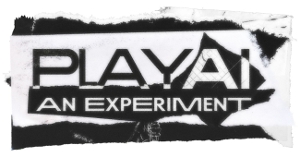Feature: Is AI the Future of Live Theatre? Not Yet.
Matt Bond trained ChatGPT to write and direct its own play in an astonishing Asimovian experiment.

The launch of ChatGPT has been received with general apprehension, if not frantic worry, by writers worldwide. If you can train Artificial Intelligence to deliver copy as profound, correct, and well-written as it's humanly possible, does it mean that writing is soon to be an obsolete profession?
The reality of things is actually a bit different, as the software is still deeply flawed and it produces information that can be factually wrong. It's only at an early stage though, and it is improving quickly. Director and producer Matt Bond has experienced this first-hand with PlayAI. Bond trained ChatGPT to write and direct its own piece of theatre. It's a bonkers experience.
After over 200 prompts, the AI wrote a 45-minute play about treachery in a legal firm. Bond explains that the number of cues he had to give ChatGPT was simply to get it to draft something of substance, since the program tends to be excessively concise. It turns out that it also likes to indulge in melodrama and delights in micromanaging the actors with specific stage directions. It's efficient in terms of speed but largely lacks the creativity and flair of a human author. For now.
The director revealed that in a mere two-week period, the themes ChatGPT would tackle changed drastically. While it maintains a strong moral code, it went from wholly avoiding any mention of violence, to actively inserting plot points like sexual assault allegations, the leak of a sex tape, or even knife threats into the story. As it stands, it offers quite a stale and tedious textual approach, devoid of any finesse and research when it comes to language and its use.
While it's easier to point out what the program can't do compared to humans, it's shocking that a bunch of code strung together can produce something that, however basic and plain, features all the infrastructure, beats, and tempo, necessary to stage it. It might not have a great grasp of tone and timeline and its turns of phrase may be rough and screeching, but it's an astonishing achievement.
Ultimately, what's missing is sophistication. The timelines are more than a bit jagged and there's very little character exploration, but who's to say what could come of it once the chatbot learns to analyse the essential patterns that create nuance? Joe Bolland (who played the baddie) pointed out that he felt slightly freer when it came to working on the subtext, or, rather, its lack thereof. It certainly is an interesting balance.
It's easy to see that AI will soon be implemented in theatre, just like it's starting to be in other areas and aspects of life. As Bond points out, we probably have around a year or so to decide how we can apply it to our benefit, instead of ending up having it thrust upon the theatre industry by a third party.
It doesn't end here. The play was introduced by a prologue reiterating its experimental status and warning against using mobile phones and even brawling. If you were to imagine a handful of Siri speaking to one another with different accents, you wouldn't be too far off.
Once the actors took their bows, the AI voices came back to review the piece and discuss it. It turns out ChatGPT is a brutal, savage critic. It tore itself down, detailing the shortcomings of its own writing and the revisions that could improve it. In truth, it's not wrong, but it definitely lacks tact.
Playwrights, directors, sound designers, and critics too might be safe for now, but we can't rule out an AI invasion in the near future.
PlayAI was at Riverside Studios.
Comments
Videos

